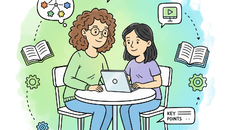Why is Coding Important for Kids?
- Kushal questfortechnology@gmail.com

- Apr 14, 2025
- 4 min read
Updated: Oct 21, 2025
The digital-first world that we are experiencing , teaching kids to code isn’t optional — it’s essential.
Platforms like LittleLit are leading the way with child-first, hands-on AI-powered learning experiences that help kids not only understand technology but create it.
When children learn to code, they:
Understand how digital tools and games actually work.
Strengthen their logical reasoning and critical thinking skills.
Build confidence as they bring their ideas to life.
And with the rise of AI, coding becomes even more important — it’s a language for the future.

Key Takeaways
Coding teaches core life skills like logic, problem-solving, and perseverance.
AI makes coding more accessible by simplifying complex topics for young minds.
AI tools like LittleLit’s platform offer guided support, interactive projects, and safe exploration for kids.
Combining coding with AI literacy prepares kids for real-world challenges in a tech-driven world.
The earlier kids start, the more confident and creative they become in shaping the digital world.
What Are the Benefits of Learning to Code?
Step-by-step thinking: Coding teaches kids how to approach problems in logical sequences.
Creativity: From building games to apps, coding lets kids express their imagination.
Resilience: Debugging teaches perseverance and the value of iteration.
Confidence: Seeing their own creations come to life builds pride and motivation.
Whether it’s writing a simple game or designing a chatbot, coding turns passive screen time into active, skill-building play.
What Challenges Do Kids Face When Learning to Code?
Let’s be honest — coding can feel intimidating, especially at the start.
Common roadblocks:
Lack of engaging and age-appropriate learning resources
Overly complex coding concepts that discourage beginners
Not enough real-time support or feedback
Losing motivation if they don’t see quick wins
This is where AI-powered support systems like LittleLit’s tools come in — offering clear guidance, bite-sized challenges, and personalized feedback so that kids feel supported at every step.
Why Combine AI with Coding Education?
1. Simplifies Complex Concepts
AI tools help explain loops, variables, and logic in kid-friendly language — breaking down barriers to entry.
2. Personalized Learning
Every child learns differently. AI adapts to their pace, offering nudges, hints, or deeper challenges when needed.
3. Goes Beyond Code
With AI, kids not only learn how to build — they learn:
How AI thinks
How to ask good questions
How to use tech ethically and responsibly
This combination creates digitally fluent, thoughtful creators — not just coders.
How AI Tools Make Coding Easier for Kids
At LittleLit, several AI-powered tools are built specifically for young learners:
Tool | What It Does |
AI Homework Helper | Breaks down assignments step-by-step, helping kids tackle challenges with clarity. |
AI Chatbot for Kids | Offers instant guidance when they’re stuck — just like having a 24/7 coding buddy. |
AI Writing Coach | Helps kids write clean, well-commented code and explain their ideas. |
Interactive Coding Projects | Lets kids build games, animations, and apps with real-time AI feedback. |
These tools empower kids to explore confidently, turning frustration into fun.
Coding Is Just the Beginning: Build Critical Skills for the Future
Teaching kids to code builds more than technical knowledge. It fosters:
Design thinking
Teamwork (when working on group projects)
Communication (explaining how their code works)
And when combined with AI tools, kids also learn:
Ethical use of tech
Responsible data handling
Awareness of AI limitations and biases
Why Choose LittleLit AI?
LittleLit isn’t just a tool — it’s a complete AI + coding education platform for kids.
✅ Built for Ages 6–14
Every lesson is leveled by age and comprehension — no jargon, no shortcuts, just safe, fun learning.
✅ AI Curriculum for Kids
Structured lessons align with global standards and combine coding + AI for a holistic approach.
✅ Whole-Child Learning
From technical skills to creativity and ethics, LittleLit empowers well-rounded growth.
✅ Parent + Educator Support
Guides, dashboards, and built-in safety features make it easy for adults to stay involved.
Explore More from LittleLit
FAQs
1. Why is it important to teach kids coding?
Coding equips children with problem-solving skills, logical thinking, and creativity. LittleLit AI provides resources, such as the AI writing coach for Kids, to help children grasp coding and AI concepts in an engaging, accessible way. This combination of coding and AI prepares young learners for a tech-driven future.
2. At what age should kids start coding?
Kids can begin learning basic coding concepts as early as 5–7 years old. LittleLit AI offers an approachable starting point through visual programming exercises and activities that foster early computational thinking skills.
3. What are the benefits of learning coding for students?
Learning coding helps students think critically, solve problems, and bring creative ideas to life. LittleLit AI’s AI Homework Helper and Kids AI Models provide step-by-step guidance, making coding more approachable and giving students confidence as they tackle digital projects.
4. What is coding used for kids?
Coding lets kids create digital projects like games, animations, and websites. With LittleLit AI’s AI Writing Coach for Kids, children can practice coding logic and problem-solving through interactive exercises, making learning fun and educational.
5. What does coding enable children to learn about?
Coding helps children understand logic, sequencing, and algorithms. With tools like LittleLit AI’s Kids AI Models, they can learn how technology functions and experiment with creating digital environments, all while developing critical thinking and creativity.
6. What is the purpose of coding? Coding involves creating instructions for computers to perform specific tasks. Coding opens the door to digital creation, enabling kids to build apps, games, and websites while developing logical reasoning and innovative problem-solving abilities.
















